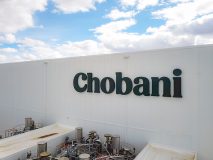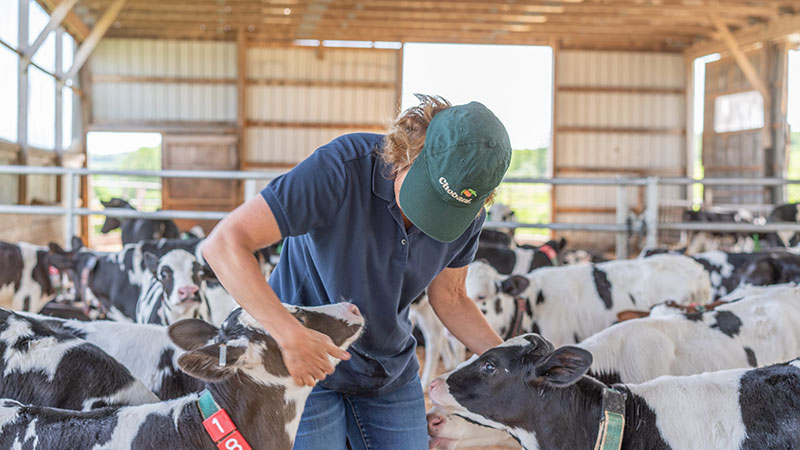Chobani revealed July 2 that it is collaborating with Fair Trade USA to look at developing the first-ever standard and certification program for the dairy industry.
The program, called Milk Matters, focuses on greater transparency around fresh milk from local farms. The program is not only for Chobani’s own milkshed but all dairy farms.
Chobani says it wants to empower consumers to feel confident in knowing where their dairy is from and the difference it is making.
“Many current industry programs and certifications, while well-intended, address single issues in isolation and haven’t gone far enough to truly provide relief for struggling farms,” according to Chobani, a Norwich, New York-based maker of Greek yogurt products.
Chobani spent the past several years listening to farmers, farm workers, elected officials and experts across the dairy industry to create Milk Matters.
The program will include co-op partners, dairy farms and third-parties such as Fair Trade USA, the World Wildlife Fund (WWF), National Milk Producers Federation, Cornell University, state programs and community foundations in Idaho and New York to validate the continued progress.
Milk Matters is working toward 100 percent implementation by 2025.
 “Proud to share our vision for the future of dairy—from cows to people to planet. It’s a small step with a big message: the future of dairy farmers matters to all of us,” said Hamdi Ulukaya, founder and CEO of Chobani. “Dairy farms are the backbone of the communities we call home, but the current model is broken and it’s leaving consumers questioning everything, including the treatment of animals, farm workers and the land itself. Our solution is simple but powerful. We all have a responsibility to support the farmers who make our business and our vision possible.”
“Proud to share our vision for the future of dairy—from cows to people to planet. It’s a small step with a big message: the future of dairy farmers matters to all of us,” said Hamdi Ulukaya, founder and CEO of Chobani. “Dairy farms are the backbone of the communities we call home, but the current model is broken and it’s leaving consumers questioning everything, including the treatment of animals, farm workers and the land itself. Our solution is simple but powerful. We all have a responsibility to support the farmers who make our business and our vision possible.”
Paul Rice, CEO of Fair Trade USA, said, “This is a big move for one of the important sectors of agriculture in the U.S.—creating shared trust, partnership and value between consumers, farms and brands with a Fair Trade USA standard for dairy. By funding the exploration and development of a standard that will be available to the entire dairy industry, Chobani is taking a real leadership position. We’re thrilled to support an initiative that will drive continued progress, value, and transparency across the dairy industry.”
“Working with over 900 dairy farmers, Chobani can help the dairy industry reduce its environmental impacts. WWF will work with Chobani and its supplying cooperatives to identify and promote better management practices that use natural resources more sustainably. Chobani has further committed to reducing greenhouse gas emissions, using science-based targets in line with the goals of the Paris climate agreement,” said Sandra Vijn, WWF dairy director.
“This is the first time in my experience at Cornell that a dairy processor has stepped forward during a challenging economic time and wanted to do something extra to help the farms in their milkshed,” said Dr. Tom Overton, director of the Cornell CALS Pro-Dairy Program. “I commend Chobani for this commitment and look forward to working with them to benefit the New York dairy farms that provide their milk.”
Six pillars
There are six critical pillars supporting the Milk Matters program, according to Chobani:
• Worker well-being: From safety and training programs to wage standards to a support hotline for outlier situations, Chobani will work with dairy cooperatives, farmers and farm workers to create a system where the dairy industry has support. To achieve this, Chobani is collaborating with Fair Trade USA to explore a first-of-its-kind certification standard for U.S. dairy that protects and empowers dairy workers and provides meaningful premiums to benefit farmers and farm workers alike.
• Environmental stewardship: Chobani is collaborating with the World Wildlife Fund and National Milk Producers Federation’s Farmers Assuring Responsible Management (FARM) to reduce the company’s carbon footprint and help farms do the same. These partners will measure greenhouse gas emissions and energy use on dairy farms within Chobani’s supply chain to identify potential efficiency gains and cost savings for farmers.
• Animal care: All of the dairy cooperative farms Chobani sources from today are participating in National Milk’s Farmers Assuring Responsible Management (FARM) Animal Care program and have completed an on-farm evaluation. By December 2019, all of the farms Chobani sources from through the company’s cooperative partners will comply with National Milk’s FARM Version 3.0., the industry’s highest standard for animal care.
• Local sourcing: From its founding, Chobani has been committed to sourcing the fresh milk from local farms surrounding its manufacturing plants in Idaho and New York, the company says. As a member of the New York State Grown & Certified and Idaho Preferred programs, local sourcing is an important way to support agricultural communities, while ensuring Chobani’s products are as fresh as possible and that its carbon footprint is minimized.
• Investing in dairy communities: Every dairy maker has a responsibility to the communities that support them. Chobani has partnered with the Community Foundation for South Central New York and the Idaho Community Foundation with a plan to invest $2 million in grants over the next decade to fuel big ideas from local community organizations, expand economic opportunity and promote entrepreneurship. And through the Chobani Scholars program, Chobani is funding multi-year scholarships at Cornell University and the University of Idaho for students of dairy farming families looking to pursue a degree in dairy science.
• Freedom and flexibility for dairy farms: When it comes to the grains a farmer feeds their cows, Chobani is giving them the freedom to farm as they know best. We refuse to mandate the use of non-GMO feed, a practice that places an undue financial burden on farms without enough demonstrated value to the planet or people. Additionally, to support farms for the future, Chobani has partnered with the Cornell Pro-Dairy program and New York State’s Dairy Acceleration Program to help farms with less than 300 cows receive funding for small projects to address specific business needs. These funds will support business planning and improved profitability strategies through on-farm production techniques and aspects related to the day-to-day farm operation.

